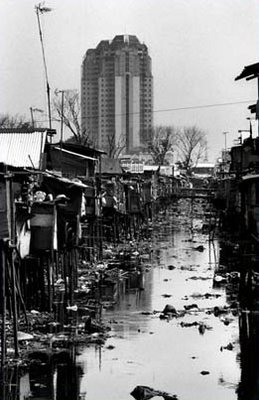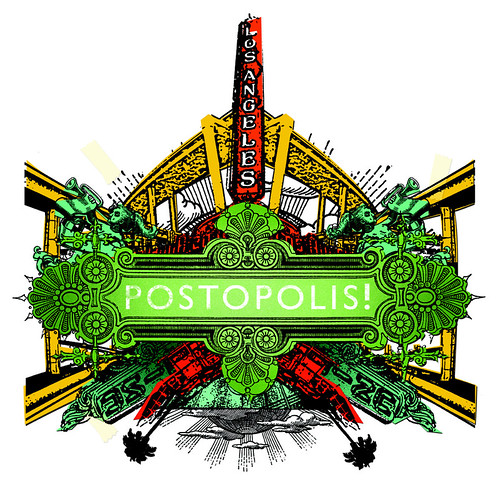Slum Ecology

In his new book, Planet of Slums, Mike Davis argues about a "fundamental reorganization of metropolitan space" around the world, where hundreds of thousands of rural migrants flock to the cities every day, driven by reckless international economic policies which have decimated rural infrastructures worldwide, have demonized peasants, and gone on to create "unprecedented incubators of new and re-emergent diseases" in today's megaslums "that can travel across the world at the speed of a passenger jet." Cities have absorbed nearly two-thirds of the global population explosion since 1950, and are currently said to be adding close to a million new babies and migrants each week.

For these new arrivals, it is a condition Davis says "that can only be described as marginality within marginality", a "semi-death." With only 20 percent of new housing stock supplied by formal real estate development, out of sheer necessity and survival, "people turn to self-built shanties, informal rentals, pirate subdivisions, or the sidewalks. (...) And because the geographic location of slums is becoming more and more marginal, the destructive power of natural elements leaves today's slum residents in an ever more vulnerable state."

Driving global urbanization at hyperspeed, these nearly 2 billion slum dwellers "are the pioneers of swamps, floodplains, volcano slopes, unstable hillsides, desert fringes, railroad sidings, rubbish mountains, and chemical dumps—unattractive and dangerous sites that have become poverty's niche in the ecology of the city," while the rich, continuing their trendy retreats to the countryside, can fulfill a jewel encrusted destiny behind their gated communities in an "elusive and golden nowhere."

In the latest issue of Orion magazine, Davis prints a chapter from his new book entitled Slum Ecology, which gives a brief examination of how the restructuring of Third World urban economies has not only contributed to dangerous health conditions around the world, but has also ruined our capacities for responding to those conditions, which ultimatley imperils the rest of the world with the same disasters seen endemic only to the slums. He also warns of the myth that by adding more people to the city you are contributing to a stronger economy, when in fact "the pull of the city is drastically weakened by debt and economic depression."

"Urban theorists have long recognized that the environmental efficiency and public affluence of cities require the preservation of ecosystems, open spaces, and natural services: cities need them to recycle urban waste products into usable inputs for farming, gardening, and energy production. And along with intact wetlands and agriculture, sustainable urbanism presupposes a basic level of safety—of meteorological, hydrological, and geological stability, and protection against disasters like floods or fire. None of those conditions can hold in most Third World cities. Suffering under a series of crushing pressures, most recently a quarter-century-old regime of Draconian international economic policies, cities are systematically polluting, urbanizing, and destroying their crucial environmental support systems.
But if ecological reality prevails, it won't stop there. Today's megaslums are unprecedented incubators of new and re-emergent diseases that can travel across the world at the speed of a passenger jet. And, as the imminent peril of avian influenza indicates, economic globalization without concomitant investment in a global public-health infrastructure is a formula for catastrophe. It takes only a little imagination—the thought of a series of ill-fated airplane trips—to remind us that we're all living on the same planet of slums, under the same economic regime. The conditions creating the slums—greed, inequity, poor planning, and disrespect for human rights—are human forces, but they tend to intensify the Earth's natural forces. Those forces, ecological and biological, don't always behave as predictably as we would like, or stay within their bounds."
Slum Ecology by Mike Davis (Orion Magazine)
Photographs by SEBASTIÃO SALGADO (except for the last one, photographer unknown)
Also see:
Planet of Slums (extract in the New Left Review)
The Space Race (A review in the Village Voice)







2 Comments:
I love Mike Davis for his ferocity and I have long detested the idea that countries hock their citizens to the yoke of the IMF. But there's a bit of hyperbole here. Squatter communities arose in the world's cities long before any economic readjustment programs were in place. And they often were founded in environmentally degraded places by choice: because land invaders knew that no one would contest their right to be there.
What's more, I don't think it's anything but fearmongering to say that "Today's megaslums are unprecendented incubators of new and re-emergent diseases that can travel across the world at the speed of a passenger jet."
Public health is a nightmare in many squatter communities and I knew many really sick people in the shantytowns of Nairobi, for instance. But I have yet to see a convincing scientific argument linking something like SARS or bird flu to squatter communities. Indeed, the sad tragedy is that the diseases afflicting the urban poor around the world are treatable.
Yes, squatter communities are chaotic and, often, problematic. But Mike's apocalyptic screed makes it seem like the only answer is mass demolition. And who should we trust to rebuild? The very governments that discriminated against these communities for so long?
I'm a believer in the power of incremental change. Maybe there won't be a revolution, but people can get a paved road, or water pipes, or a joint program employing some residents to start a garbage pick-up scheme.
Yes, the process is slow. And yes, it's not very sexy, from a global point of view. But that's the way people can make their lives better. Then, once they've achieved some positive change on the ground, they can perhaps turn their attention to those deleterious structural adjustment programs and they can rout the corrupt political strongmen who signed on the dotted line.
Here's a Dylan Thomas poem that seems apt:
The hand that signed the paper felled a city;
Five sovereign fingers taxed the breath,
Doubled the globe of dead and halved a country;
These five kings did a king to death.
The mighty hand leads to a sloping shoulder,
The finger joints are cramped with chalk;
A goose's quill has put an end to murder
That put an end to talk.
The hand that signed the treaty bred a fever,
And famine grew, and locusts came;
Great is the hand that holds dominion over
Man by a scribbled name.
The five kings count the dead but do not soften
The crusted wound nor pat the brow;
A hand rules pity as a hand rules heaven;
Hands have no tears to flow.
Rob,
Well said.
and that's really interesting about the squatters asuming space in hazardous areas by choice, as a shield against eviction, etc. I really need to learn more about squatter histories.
When i first read that line, too, about 'the megaslum as incubator for global disease', it did strike me as a bit egregious, but i also interpreted it less as a shot at squatters, (or a fearmongering), and more as just a serious warning to the global-forces-that-be which have largely engineered the degraded state of slum ecologies around the world. But, your concern about the effect of that statement i think is accurate. I feel though that the establishment needs to be rattled, they need to realize the potential backlash of their policies, they need to realize to what degree they are not only dictating the conditions of billions of lives in the slums, but ultimately the interconnectedness of those places to their own fortified untouchable dream worlds. it's like putting the gravity of the situation in the IMF's own terms. until they realize that their devastating policies will have a real impact in their own precious worlds, they will not see the slums as the anything but isolated leftover peoples, trash, superflous lives of globalization, meant to be outcasted, isolated, quarentined, etc. i think his tone is both disgusted by the situation, but also uses that to throw it back in their face, as if to say, hey, unless you wake up and realize the impacts of your policies, dear rulers of the world, you will soon be dealing with a problem far bigger than you could ever imagine.
i dont know. the architects of the so called global economy need to feel the sense that, in all their neglect, they could be engineering the demise of us all. and the slums are just a way to reflect that reality, not neccesarily be the ultimate cause of it. though, the slums as infectious space could also breed many positive things around the world, too. that same viral impact on the world could be seen spreading many things upwards, not just pestilence. i cant wait to read the book, but i also hope in all its ferocity and research, that some squatter utopianism (for lack of better term) will be alluded to as well. squatters as suprising future urban model, or something, as crazy as that may sound. cause it aint all just disease and poverty and rubbish, but community innovation, real grassroots urbanism is emerging. yada yada yada.
and that poem is great, man.
Post a Comment
<< Home